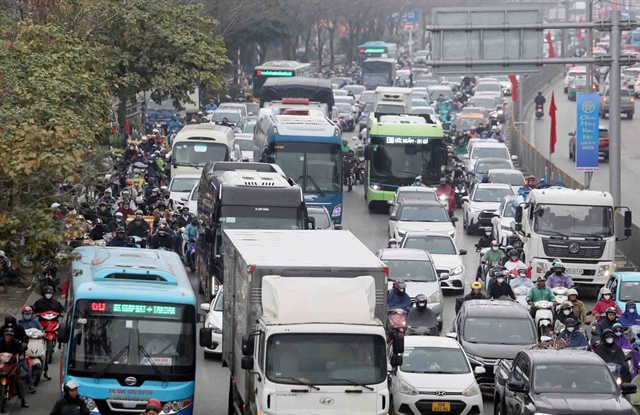 Society
Society

 |
| Motorbikes, cars, buses and trucks mingle on Giải Phóng Street in Hà Nội in late January. — VNA/VNS Photo Phạm Kiên |
HÀ NỘI — Motorbikes are expected to continue to be the preferred mode of transport for the majority of Việt Nam’s population, but experts are raising concerns over the high accident risks associated with them.
Motorbikes play a crucial role in the daily life and livelihoods of most people, especially with the inadequate public transport services, relatively low income levels and the modest infrastructure failing to meet the travel demands, according to Lê Kim Thành, deputy chairman of the National Traffic Safety Committee (NTSC).
Citing examples from Hà Nội and HCM City, Thành noted that these cities have the most developed traffic infrastructure in the country, yet their public transportation systems only meets about 10-15 per cent of travel demands.
Meanwhile, their road density and the number of buses per one million people, are much lower compared to other Asian cities.
“If the expansion of road networks and public transportation continues at the current pace, in the next decade, our provision of public transport services and infrastructure will remain very modest compared to other cities in the region,” said Thành.
Meanwhile, statistics from authorities show that motorbikes are involved in approximately 65-70 per cent of traffic accidents.
“It should be stressed that not every accident is caused by a motorbike. In many cases, motorcyclists are the victims,” added Thành.
Discussing the current state of infrastructure in the country, Associate Professor Dr. Vũ Hoài Nam from the University of Civil Engineering said that Việt Nam’s traffic system lacks lane separation.
This means large trucks share the same roads with small vehicles in urban zones, leading to numerous accidents.
Nam suggested: “There should be standards for lanes dedicated for trucks passing through urban zones, which other vehicles are not allowed to enter.”
This measure will ensure safety while no ban is needed for trucks travelling through the cities, therefore avoid adverse economic impacts.
Trần Hữu Minh, chief of the NTSC office, also raised safety concerns towards children and adolescents, many of whom regularly use electric bikes to go to school.
“Adults can only operate a vehicle when they have a licence. However, children lacking traffic safety knowledge are allowed the same thing, resulting in a high risk of accidents,” said Minh.
He added that the current training programmes and tests lack many crucial elements on handling real-life situations.
For years, the test for a motorbike driver’s licence has required test takers to ride the same figure-eight or number-three patterns for years, while in reality, many dangerous scenarios can occur with multiple trucks and cars on the road, said Minh.
In addition, there is a lack of regulations on transporting children under six without helmets, and on standards for children’s helmets when sitting on motorbikes.
Minh therefore recommended authorities revamp training and testing programmes, and develop a thorough traffic safety curriculum in schools.
“For the training to be effective, assessment exams should be mandatory for students,” he said.
The chief of the NTSC office also urged faster progress on the national database of vehicles in circulation and their registered owners, which should allow for the effective implementation of post-violations fines and ensure that the law is strictly and fairly enforced. — VNS




